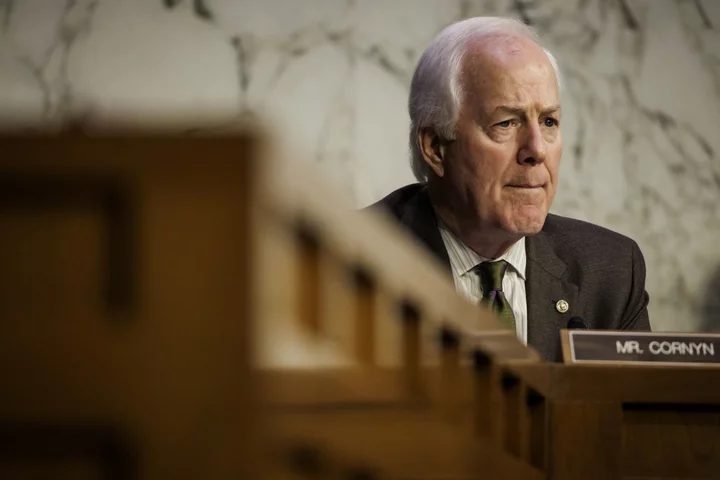
Republican Senator Questions Trump’s Electability on Eve of Arraignment
Donald Trump’s stranglehold on the Republican Party showed some signs of weakening Monday as an influential GOP senator
2023-06-13 07:27
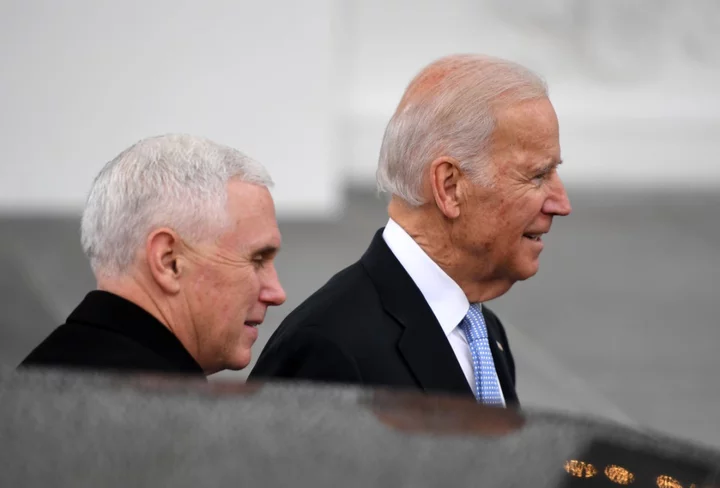
Biden and Pence were also caught with classified documents. Why is Trump’s case different?
Donald Trump’s supporters and many Republican officials contend that the former president is the target of a politically weaponised justice system that has ignored similar alleged crimes committed by his rivals. “Lock her up” chants directed at Hillary Clinton still dominate GOP rallies. House Republicans have launched committees to investigate the sitting president and his family. But in classified documents cases involving President Joe Biden and former vice president Mike Pence, both men cooperated with federal law enforcement and returned those records. Ms Clinton was not found to have deliberately mishandled classified information or obstruct justice in the recovery of communications. Mr Trump, according to prosecutors, did exactly that. A federal indictment details the alleged coordination among Mr Trump, his aides and attorneys to bring documents to his Mar-a-Lago property and, later, conceal them from law enforcement when US officials sought their return. His alleged refusal and obstruction is at the centre of the 37-count indictment against him. The indictment lays out more than 40 pages of allegations based on witness testimony and recordings allegedly showing how the former president sought to hide and keep classified documents by conspiring with his aides to obstruct an investigation into their recovery, then lied to both the government and his own attorneys about them. He faces 31 counts of willful retention of national defence information in violation of the Espionage Act, carrying a maximum prison sentence of 10 years. Each count represents a different top-secret document Mr Trump held at his Mar-a-Lago property, months after he left the White House in January 2021. The indictment does not include charges connected to dozens of other documents that he ultimately did return in the course of investigations surrounding the case – underscoring some of the key differences between his prosecution and those involving the former vice presidents. Late last year, a lawyer for Mr Biden discovered a “small number” of classified documents from his time as vice president under then-President Barack Obama during a search of a Washington DC office space. Those documents were returned to the Justice Department. Another batch of documents were discovered at his home in Wilmington, Delaware. Federal law enforcement agents found more when they searched the property. In January, US Attorney General Merrick Garland named a special counsel to investigate those documents, which is still ongoing. No charges have been filed. The Justice Department also closed an investigation into Mr Pence earlier this month after the discovery of classified material at his home in Indiana. There were no allegations of obstruction or the willful retention of such documents, and no charges were brought against him. And in Ms Clinton’s case, then-FBI director James Comey said she was “extremely careless” with her handling of sensitive information, but law enforcement officials found no clear evidence that she intentionally obstructed justice or committed any other crimes in connection with the server. He said “no reasonable prosecutor” would have brought a case against her. Those findings stand in stark contrast to the allegations in the indictment against Mr Trump, who is accused of actively concealing documents and even suggesting that a lawyer hide them or falsely state to authorities that all requested records were returned, while hundreds remained at his property. None of the nearly 200 documents that Mr Trump ultimately returned to authorities are connected to the charges against him, suggesting that if he had returned them in the first place, he may not face criminal prosecution. In January of last year, a year after leaving the White House after losing his 2020 re-election bid, Mr Trump gave 15 boxes of documents to the National Archives and Records Administration, as required under the Presidential Records Act. The agency wrote to Mr Trump in May 2021 noting that some documents were missing, noting that there are “certain paper/textual records that we cannot account for.” Around that same time, according to the indictment, Mr Trump directed aides to clear a storage room on the ground floor of Mar-a-Lago. More than 80 boxes were moved there, according to prosecutors. A few months later, he allegedly showed a “plan of attack” document prepared by the US Department of Defense to a group at his Bedminster, New Jersey club. “As president I could have declassified it,” he said, according to a transcript of a recorded conversation in the indictment. “Now I can’t, you know, but this is still a secret.” The National Archives received 15 boxes from Mr Trump in January 2022, 14 of which contained classified materials, according to prosecutors. Among them, 67 were marked “confidential,” 92 were marked “secret” and 25 were marked “top secret.” The next month, the agency alerted the US Department of Justice that classified information was discovered in those boxes. It was then that a criminal investigation surrounding the former president started to build – not from the results of the National Archives and its ultimately successful recovery of 15 boxes. A federal grand jury was opened in April of last year. In the weeks and months that followed, Mr Trump’s aide Walt Nauta began moving more than a dozen boxes out of the storage room, according to the indictment. Mr Nauta also is charged in connection with the case. On 3 June of last year, Mr Trump’s then-attorney Christina Bobb falsely certified to federal law enforcement that the former president’s legal team performed a “diligent search” for “any and all responsive documents” at his property, and that no other classified documents were found, according to prosecutors. The Justice Department received 38 documents in that file, including 17 marked “top secret,” 16 labeled “secret” and five others marked as confidential. Meanwhile, Mr Nauta and others loaded several boxes onto a plane that Mr Trump boarded out of his Florida home, according to the indictment. In August, FBI agents performed a search of Mar-a-Lago and discovered more than 100 classified documents among hundreds of government documents and photographs. In the documents outlined in the indictment, at least two of which involved nuclear secrets according to an inventory listed in the indictment, 21 were discovered by FBI agents who searched Mar-a-Lago. Ten others were turned over to federal authorities last June in response to a grand jury subpoena. Others involved intelligence briefings, foreign military activity, communication with foreign leaders, foreign military impacts on US interests, and communications with a foreign leader. According to prosecutors, Mr Trump conspired to conceal documents from a grand jury and federal officials, by suggesting that his attorneys make false statements to authorities, by moving boxes of documents to hide from attorneys, by suggesting that documents be hidden or destroyed, and by falsely certifying that classified documents were produced to authorities “when, in fact, they had not.” Prosecutors are expected to present compelling evidence that the former president knowingly and deliberately misled his attorneys about his retention of sensitive documents He also appears, on a tape, six months after leaving office, saying that a document in his possession was “classified”, “highly confidential” and “secret information” while admitting that he was not able to declassify it, because he was no longer president – undercutting a critical part of his public defence over the last several months. Read More Trump indictment - news: Trump vows revenge as he lands in Miami for arraignment on 37 federal charges Trump, Biden, Pence - who else? Inside the presidential scramble to check for classified documents How Trump’s second indictment unfolded: A timeline of the investigation into Mar-a-Lago documents ‘This is war’: Police monitoring online far-right threats and pro-Trump protests with federal indictment Handcuffs, fingerprints or a mugshot? What to expect as Trump faces arraignment in federal court Aileen Cannon: The judge with Trump’s fate in her hands was appointed by him
2023-06-13 07:23

First woman to serve as New York City's top cop announces surprise resignation
NEW YORK New York City Police Commissioner Keechant Sewell, the first woman to lead the nation's largest police
2023-06-13 07:15
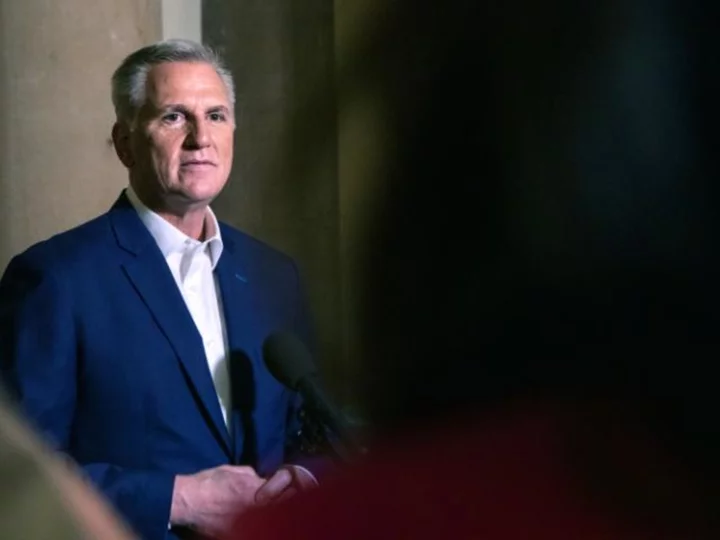
McCarthy and hardliners reach tentative agreement to resume House floor business
Hardline conservatives have agreed to end their blockade of the House floor while they continue discussions with House Speaker Kevin McCarthy about future spending decisions and a new "power-sharing agreement," according to multiple members leaving the speaker's office.
2023-06-13 06:57

Wall Street Momentum to Support Asian Stocks Open: Markets Wrap
Asian equities will open Tuesday with support from a rally on Wall Street amid optimism that the Federal
2023-06-13 06:50
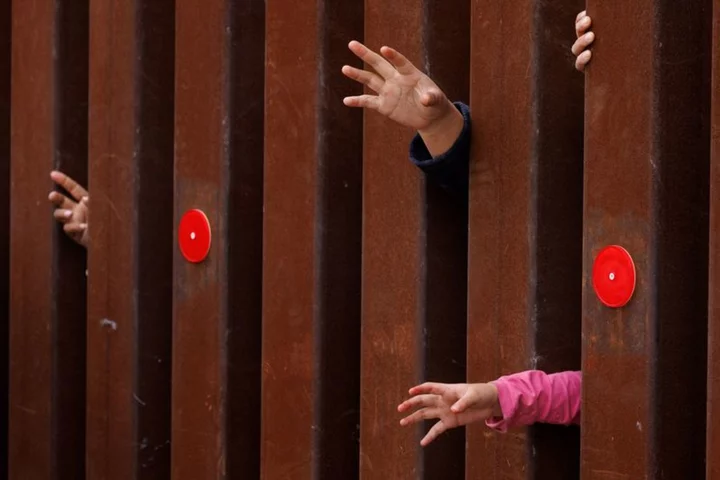
U.S. suspends asylum appointments in Texas border city after extortion reports
By Daina Beth Solomon and Ted Hesson MEXICO CITY U.S. asylum appointments at a dangerous Texas-Mexico border crossing
2023-06-13 06:49
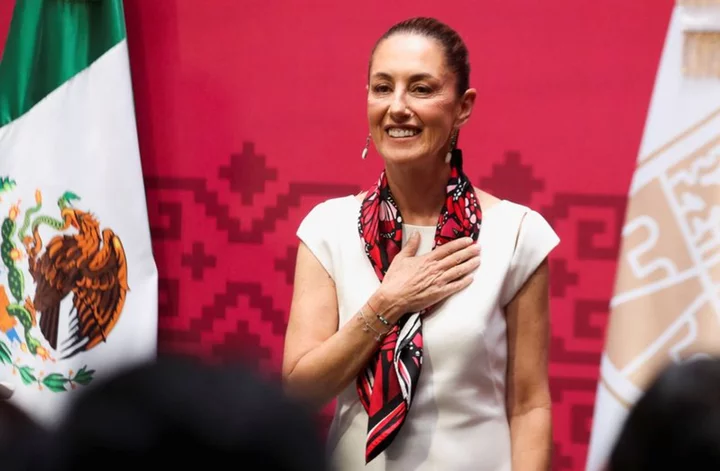
Mexico City mayor to step down to pursue historic bid for presidency
MEXICO CITY (Reuters) -Mexico City Mayor Claudia Sheinbaum said on Monday she will step down this Friday to pursue the
2023-06-13 06:26
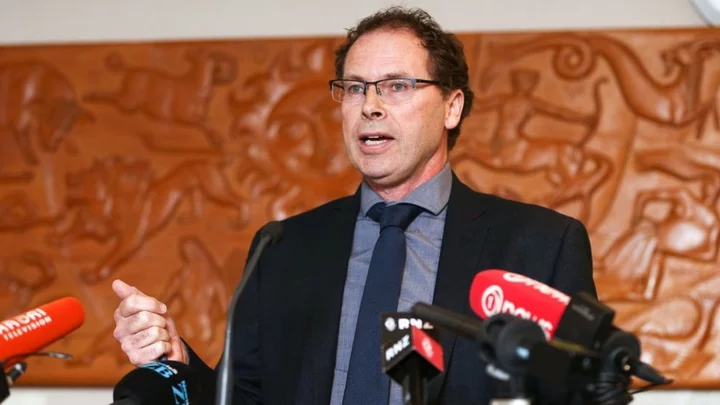
Radio New Zealand apologises for 'pro-Kremlin garbage'
A journalist suspected of giving stories a pro-Russian slant has been placed on leave.
2023-06-13 05:27

Covid database: India's health ministry denies major breach
An investigation has been ordered into an alleged leak of confidential information.
2023-06-13 05:26
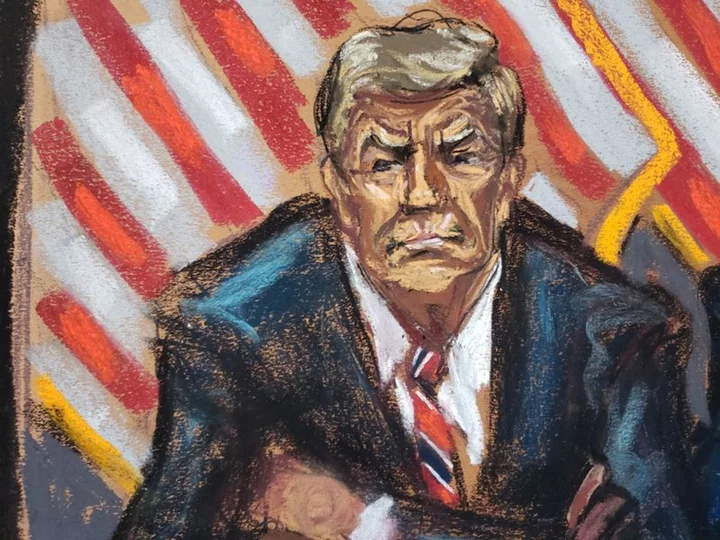
Judge in Trump criminal hush-money case can stay, NY ethics panel signals
By Karen Freifeld NEW YORK A New York judicial ethics committee signaled that the state judge overseeing the
2023-06-13 05:26
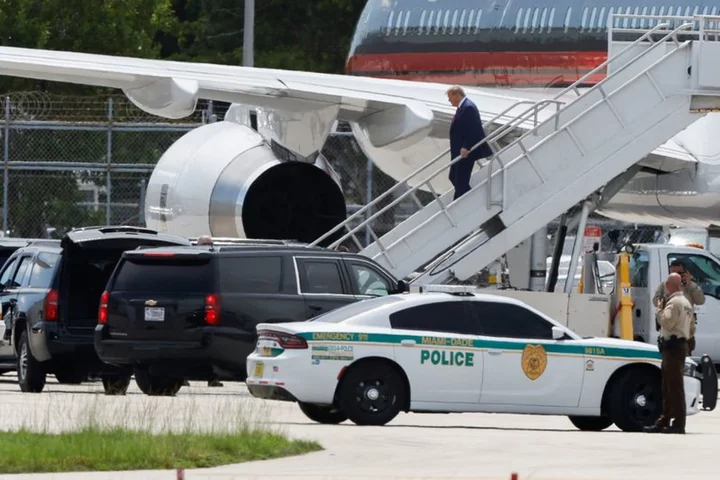
Trump arrives in Florida to face charges, maintains lead in poll
By Jack Queen MIAMI (Reuters) -Former President Donald Trump arrived in Miami on Monday to face federal criminal charges, while
2023-06-13 05:15
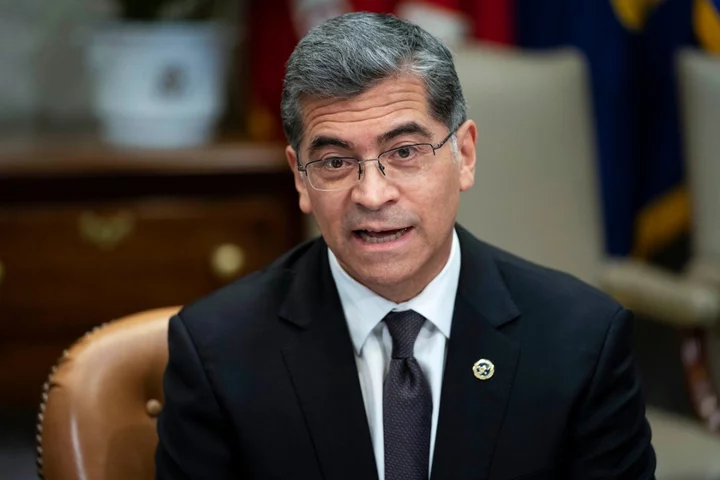
Biden administration urges states to slow down on dropping people from Medicaid
The Biden administration on Monday urged states to slow down their purge of Medicaid rolls, citing concerns that large numbers of lower-income people are losing health care coverage due to administrative reasons. The nation's Medicaid rolls swelled during the coronavirus pandemic as states were prohibited from ending people's coverage. But that came to a halt in April, and states now must re-evaluate recipients' eligibility — just as they had been regularly required to do before the pandemic. In some states, about half of those whose Medicaid renewal cases were decided in April or May have lost their coverage, according to data submitted to the Centers for Medicare & Medicaid Services and obtained by The Associated Press. The primary cause is what CMS describes as “procedural reasons,” such as the failure to return forms. “I am deeply concerned with the number of people unnecessarily losing coverage, especially those who appear to have lost coverage for avoidable reasons that State Medicaid offices have the power to prevent or mitigate,” Health and Human Services Secretary Secretary Xavier Becerra wrote in a letter Monday to governors. Instead of immediately dropping people who haven't responded by a deadline, federal officials are encouraging state Medicaid agencies to delay procedural terminations for one month while conducting additional targeted outreach to Medicaid recipients. Among other things, they're also encouraging states to allow providers of managed health care plans to help people submit Medicaid renewal forms. Nobody "should lose coverage simply because they changed addresses, didn’t receive a form, or didn’t have enough information about the renewal process,” Becerra said in a statement. States are moving at different paces to conduct Medicaid eligibility determinations. Some haven't dropped anyone from their rolls yet while others already have removed tens of thousands of people. Among 18 states that reported preliminary data to CMS, about 45% of those whose renewals were due in April kept their Medicaid coverage, about 31% lost coverage and about 24% were still being processed. Of those that lost coverage, 4-out-of-5 were for procedural reasons, according to the U.S. Department of Health and Human Services. In Arkansas, Florida, Idaho and Oklahoma, about half or more of those whose eligibility cases were completed in April or May lost their Medicaid coverage, according data reviewed by the AP. Those figures may appear high because some states frontloaded the process, starting with people already deemed unlikely to remain eligible. CMS officials have specifically highlighted concerns about Arkansas, which has dropped well over 100,000 Medicaid recipients, mostly for not returning renewal forms or requested information. Arkansas officials said they are following a timeline under a 2021 law that requires the state to complete its redeterminations within six months of the end of the public health emergency. They said Medicaid recipients receive multiple notices — as well as texts, emails and phone calls, when possible — before being dropped. Some people probably don't respond because they know they are no longer eligible, the state Department of Human Services said. Republican Gov. Sarah Huckabee Sanders has dismissed criticism of the state’s redetermination process, saying Arkansas is merely getting the program back to its pre-pandemic coverage intentions. But health care advocates said it's particularly concerning when states have large numbers of people removed from Medicaid for not responding to re-enrollment notices. "People who are procedurally disenrolled often are not going to realize they’ve lost coverage until they show up for a medical appointment or they go to fill their prescription and are told you no longer have insurance coverage,” said Allie Gardner, a senior research associate at the Georgetown University Center for Children and Families. __ Associated Press writer Andrew DeMillo contributed from Little Rock, Arkansas. Read More Ukraine war’s heaviest fight rages in east - follow live Charity boss speaks out over ‘traumatic’ encounter with royal aide Speaker McCarthy eyes new commission to tackle nation's debt, but many Democrats are wary Connecticut to adjourn largely bipartisan session in contrast to rancor in other states Missouri governor signs ban on transgender health care, school sports
2023-06-13 04:55
